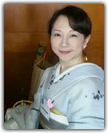Contemprary Tanka Poet Mariko Kitakubo. Article details.
TSA "RIBBONS" Vol.4, No.4 Winter '08 / Poet and Tanka II
Poet and Tanka
by Mariko Kitakubo
translated by Amelia Fielden
My father disappeared from our family life when I was a mere eight years old and still seeing the world through a young green mist. It was around when that I came to be invited to an adults only New Year party where ten or so of my relatives gathered together. What I really enjoyed there, were the traditional games and pastimes which followed our New Year feast. It was all rather different from the way I played card games and 'twisters' with girls of my own age. The most fun was the 'five seven five' word game.
I should explain this game: Each participant is given a set of five sheets of notepaper. The sheets are numbered one to five. On sheet one, the player writes whatever she likes in five syllables, on sheet two, something in seven syllables and so on in the order of 5 7 5 7 7 syllables. The leader then collects all these sets, shuffles the sheets, and reads them out five at a time, as if they were tanka. Compiled thus haphazardly, the resulting 'poems' can vary from the absurd to the brilliant. This randomness is what makes the game such fun. Everyone laughs and is companionable.
Even now, many years later, that living room with tree shadows flickering on paper screens, that room where I first played the five seven five word game, recurs like dream in my mind. It was an unhurried era, which seemed to showcase a Japan of abundant leisure hours. Perhaps that is how and why the rhythm of tanka became a delight and a source of healing for me.
I first began writing tanka about my son about sixteen years ago in 1992. It was when Tawara Machi’s Salad Anniversary tanka collection appeared, creating a sensation both on the tanka stage and in society at large. For me personally, the ‘Japanese 5/7 rhythm,’ which had been slumbering in my heart, was aroused by her work. At the time my son was already seven years old, but my mind would back to his birth, and I became absorbed in writing my memories of those early years. And as I watched my son growing day by day, it was somehow natural for me to become interested in, and in turn greatly impressed by, the excellent tanka written by youthful poets like Terayama Shuji. Simulated by such wonderful work, I wrote and published successively three collections of my tanka: I Want to Tell You in the Words of Waves (1999), When the Music Stops (2002) and Will (2005).
Then, in the fulfillment of my long-held desire, Amelia Fielden translated a large selection of the tanka from the tanka from my third collection, Will, and this was published in 2006 as the book On This Same Star.
My web site (https://www.kitakubo.com), which was developed around the same time as On This Same Star appeared, apparently caught the eye of the then editor of Ribbons, an’ya, who kindly invited me to become a member of TSA and also submit tanka in English to its journal. Which I was only too delighted to do.
It has been my unimaginable good fortune to have the door to the mansion of English tanka opened for me in this way by Amelia and an’ya.
In my recent anthology, Cicada Forest, the first chapter is entirely new, in which I try to write about now and future, both in concrete and metaphysical terms:>
we won’t know
if it’s benign
till we operate -
I’m nodding as if
this isn’t about me
it’s myself
a hundred years later
I’m scooping up,
both hands full
of warm sand
In chapter two, from I Want to Tell You in the Words of Waves, I watch a son’s growth through the eyes of mother:
joined together
by his umbilical cord
I hold my son, then
all the stars of heaven
fall down upon me
that uniform
too small in two months…
I’m happy,
I’m sad,
it lies in a drawer
Chapter three is form When the Music Stops, and contains poems with which I write about the anxiety of my own and all animate beings in the present day:
at night
when I try to hear the wind,
the sound of nails
being hammered into my coffin
rings in my ears
I feel the plight
of endangered creatures
on this planet,
like they’re looking at me
with my child’s eyes
After I lost my mother I somehow felt even more strongly the bonds between us, and I tried to express that on in On This Same Star, some of which appears in the final chapter of Cicada Forest:
tonight as I
hull kidney beans
the stone
engraved with her name
is growing cold
day by day
my cracked recollections
whirl up with the wind
on a winter’s day
of mother and child at play
My earnest wish now is too see tanka, Japan’s ancient and traditional fixed from poetry, become familiar and appreciated world-wide. I feel my responsibility as a Japanese tankaist is to continue writing and propagating our lyric verse of the best of my ability.

 Prev
Prev